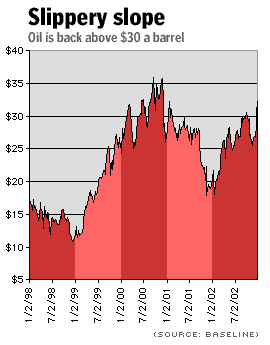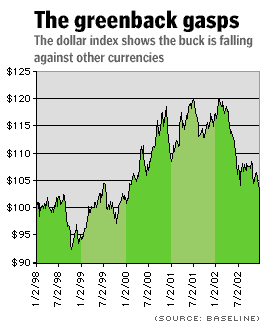NEW YORK (CNN/Money) -
Everybody, it seems, is worrying about deflation these days. It is easy to see how the soggy economy and the excesses sown during the 1990s could lead to the sort of pernicious decline in prices that bore down on the United States during the Great Depression and now has Japan in its yoke.

But the deflation chatter is not consistent with what is happening in a number of key markets. Oil is up 63 percent above where it ended 2001, gold has risen 25 percent to its highest level in over five years, and the dollar has had its steepest decline in years. In the past these three things have signaled not deflation, but inflation.
When the price of oil rises, for example, it raises costs for other producers, and they in turn raise prices. Gold is the traditional haven for investors in inflationary times. A declining dollar is both a cause and effect of inflation -- it makes imports more expensive and increases the demand for U.S. exports (which boosts our economy) around the world. Rising oil and gold prices and a drooping dollar in the early 1970s signaled the inflationary episode that came to a head in 1974. All three things happened again in the late 1970s, and again inflation followed.
"It's surprising that out of all the commentary you read on what's happening, nobody thinks it's just a basic inflationary story," said Arnhold & S. Bleichroeder economic strategist James Padinha.

Padinha thinks that the rising prices in oil and gold and the declining dollar could at least in part be a signal that the Fed's easy monetary policy and Washington's resolve to stimulate the economy are going to lift demand again. To those, who attribute the price moves to "special factors" (like heightened geopolitical risk and the Venezuelan strike in the case of oil), he points out that the world is riddled with economists and investors who cried, "This time is different," only to find that it was exactly the same.
Padinha also notes that not just the prices of gold and oil, but of a host of commodities -- everything from pork bellies to soy beans to cotton -- are rising. Argue over causes all you like, but the fact is that the raw materials that manufacturers use to make things are costing more. After plunging last year, the Commodity Research Bureau's index of commodity prices has risen 24 percent in 2002 and is back near its highs of 2000. That suggests that producer prices (what wholesalers charge) could begin to creep higher, and be followed by a rise in what consumers pay at the cash register.
"If all these things are getting more dear now, it seems like in a half year people are going to have to charge more for final goods prices," he said.

In the current environment, a little inflation might not be such a bad thing. If part of the problem with the current economy is that consumers and, in particular, companies are holding back on purchases, the threat of higher prices in the future could force them to step back up to the plate.
It would, argues Morgan Stanley chief U.S. economist Richard Berner, also allow companies to raise prices, or at least hold the line on them, without losing market share -- in other words it would give them pricing power, raising margins and, thus, profits. Eventually, maybe in 2004, too-hot inflation could be a concern again, but at some point between now and then life will be pretty sweet.

|

